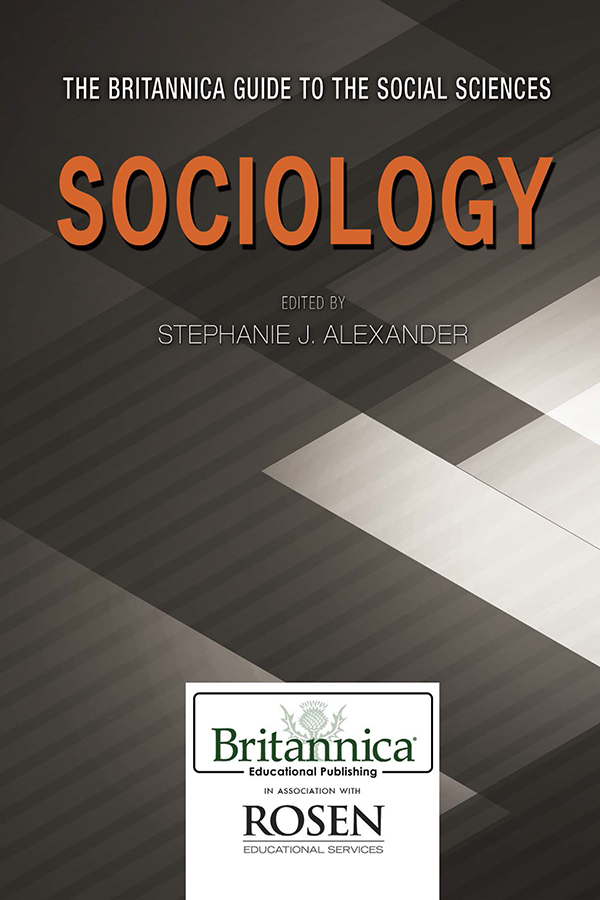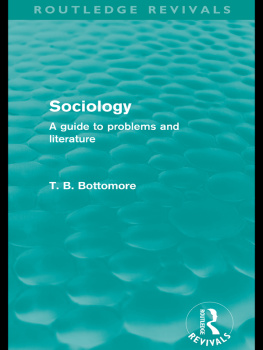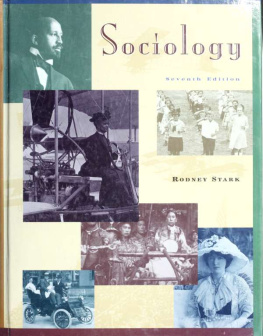

Published in 2016 by Britannica Educational Publishing (a trademark of Encyclopdia Britannica, Inc.) in association with The Rosen Publishing Group, Inc.
29 East 21st Street, New York, NY 10010
Copyright 2016 by Encyclopdia Britannica, Inc. Britannica, Encyclopdia Britannica, and the Thistle logo are registered trademarks of Encyclopdia Britannica, Inc. All rights reserved.
Rosen Publishing materials copyright 2016 The Rosen Publishing Group, Inc. All rights reserved
Distributed exclusively by Rosen Publishing.
To see additional Britannica Educational Publishing titles, go to rosenpublishing.com.
First Edition
Britannica Educational Publishing
J.E. Luebering: Director, Core Reference Group
Anthony L. Green: Editor, Comptons by Britannica
Rosen Publishing
Christine Poolos: Editor
Nelson S: Art Director
Brian Garvey: Designer
Cindy Reiman: Photography Manager
Bruce Donnola: Photo Researcher
Library of Congress Cataloging-in-Publication Data
Sociology
Sociology / edited by Stephanie J. Alexander.
pages cm. (The Britannica guide to the social sciences)
Includes bibliographical references and index.
ISBN 978-1-6227-5557-8 (eBook)
1. SociologyJuvenile literature. I. Alexander, Stephanie J. II. Title.
HM585.S61586 2016
301dc23
2015018954
Photo credits: Cover, p. 1 marigold_88/iStock/Thinkstock; p. xii H. Roger-Viollet; pp. 2, 48 Universal Images Group/Getty Images; pp. 5, 9, 43 Photos.com/Thinkstock; pp. 13, 19 ullstein bild/Getty Images; p. 25 Blend Images/SuperStock; p. 27 Joseph Sohm/Shutterstock.com; p. 30 paul prescott/Shutterstock.com; p. 32 Chris Jackson/Getty Images; p. 40 Ed Giles/Getty Images; p. 55 North Wind Picture Archives; p. 57 Photos.com/Jupiterimages; p. 62 Leif Geiges; p. 72 Bibliotheque Nationale, Paris, France/Bridgeman Images; p. 75 Photo PVDE/Bridgeman Images; p. 81 Pictorial Parade/Archive Photos/Getty Images; p. 88 Leonard McCombe/The LIFE Images Collection/Getty Images; p. 90 Archive Photos/Getty Images; p. 91 Ted Thai/The LIFE Images Collection/Getty Images; p. 99 John G. White/The Denver Post/Getty Images; p. 111 INTERFOTO/Alamy; p. 116 George Pimentel/Getty Images; pp. 120-121 Private Collection/ Look and Learn/Bridgeman Images; p. 121 Jay Paull/Archive Photos/Getty Images; p. 124 DPA/Courtesy Everett Collection; p. 132 Barcroft/Getty Images
CONTENTS
T he study of human behaviour in social groups is called sociology. This social science tries to describe everything about a society or social subgroup that gives it special characteristics distinct from other groups. The actions of animals are based mainly on instinct. Human behaviour, by contrast, seems to be shaped and conditioned by interactions among persons and groups. Sociology therefore includes the study of customs, traditions, patterns of historical development, and institutions that have emerged within specific societies. A social institution is a group organization or custom such as marriage, family, ways of holding property, educational arrangements, government, or legal system.
Within any population the smallest social unit is the family. It is therefore possible to develop a sociology of the family within a given society. There are also branches of sociology devoted to studying poverty, religion, the working class, women, immigrants, ethnic groups, teenagers, criminals, and other units. Whatever the unit, a study seeks to describe and explain the behaviour of people within the group on the basis of their distinctive customs and their interactions.
Sociology looks at how groups of people are similar and how they differ from each other. Since the 1970s, for example, there have been several studies comparing industrial workers in the United States with those in Japantrying to account for varying levels of productivity, different attitudes toward work, and different relationships to the workplace. Other studies investigate ways in which family structure among immigrants differs from family structure typical of their country of origin.
GOALS AND METHODS
Ever since sociology emerged as a scientific discipline in the late 19th century, its purposes have been disputed. Some scholars maintain that its goal is simply to understand the nature and behaviour of social groups. Others contend that the purpose of study is to cause social changeto make sociology an instrument for the improvement of the human environment. The question became: Is sociology descriptive only, or should it also be normativepresenting the standards by which change is to be measured?
The methods involved in sociological analysis are some of the same ones used in other sciences. Among them are observation, statistical measurement, data collection, experimentation, and the examination of human ecology. The chief problem in all methods is controlling the variables. It is easier to study animals and plants than human beings because plant and animal behaviours can be controlled and monitoredand they are predictable. Human behaviour, in individuals or in groups, is not predictablenor can it be easily controlled. Many more variables are found in sociological research than are seen in a chemistry or biology laboratory.
OBSERVATION
Observation, or field research, is a basic means of collecting information. It means putting oneself within a social group to see how it functions, what its institutions are, and what values it cherishes. Herbert Gans published such a study in 1962. Entitled The Urban Villagers, it was a careful examination of the Italian Americans of Bostons West End.
STATISTICAL METHODS
Statistical methods were introduced into sociology from other disciplines quite early and helped establish it as a science. The gathering of statistics proved useful in measuring trends, changes, attitudes, and other characteristics of a society. The use of statistics as a means to analyze society dates back to the 17th century. Edmond Halley, among others, used what was called political arithmetic to create mortality tables. Some analysts used birth and death rates to ascertain how rapidly the population of London recovered from the effects of the Great Plague of 166466. In France the statesman Jean-Baptiste Colbert ordered the keeping of parish records and of yearly data on marriages, births, and deaths.
DATA COLLECTION
Data collection for sociological research is done in a variety of ways, all somewhat unreliable, as allowances must be made for bias. Two common methods of data collection are the interview and the questionnaire. In both cases the questions must be comprehensible to the least-educated persons within the subject population. Questions must be meaningful to individuals of differing backgrounds; they must avoid topics that are likely to arouse resistance or hostility; and they must be precisely worded in order to avoid wide variations in the answers.
EXPERIMENTS
Experiments in social interaction are usually conducted in artificial situations, frequently laboratories and classrooms. Small-group research, such as the group dynamics sessions founded by social psychologist Kurt Lewin, produces tentative results because the participants normally know in advance they are part of an experiment. Success in experiments is usually greatest in simple situations in which the number of variables has been minimized.
ECOLOGICAL METHODS
Ecological methods of sociological research were developed in urban studies. Research on cities consists in part of mapping the distribution of population with regard to ethnicity, business and industry, and certain behaviour patternsfor example, family disorganization, mental disorders, crime and delinquency, and vice. All of these were shown to be part of a general urban ecology, and it has become possible through ecological mapping to pinpoint the sociological characteristics of a geographic area.
Next page












